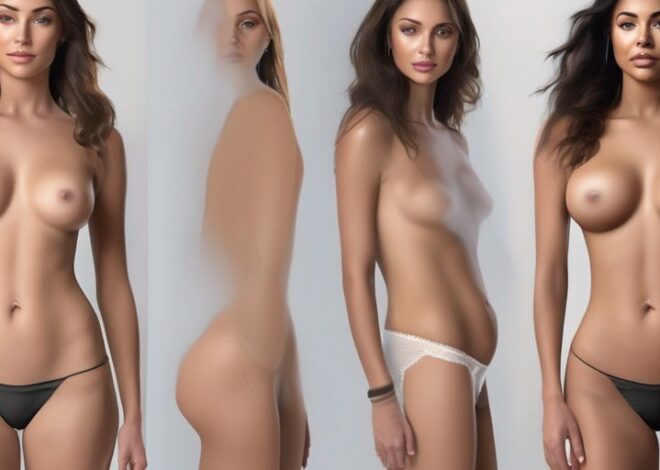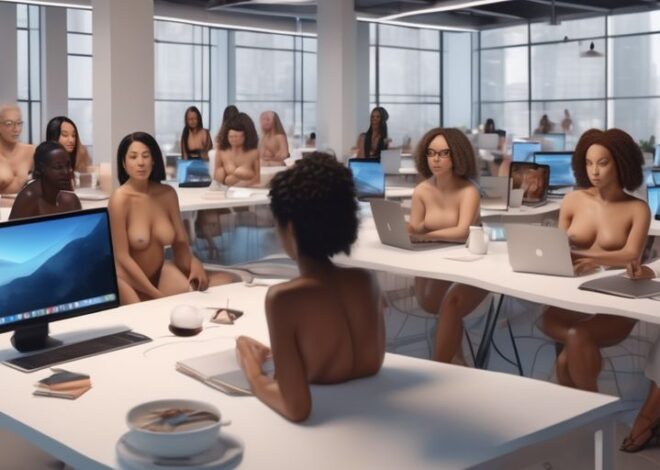
Exploring the Controversial Use of AI in Photography: The Undress Photo AI
In the rapidly evolving field of artificial intelligence, one of the most provocative applications has emerged in the realm of photography. ‘Nudify.Online,’ a sophisticated web-application launched in 2024, utilizes cutting-edge AI technology to digitally remove clothing from images. This article delves into the multifaceted implications of such technology, exploring ethical concerns, legal ramifications, and its broader impact on the photography industry and society.
Key Takeaways
- Nudify.Online represents a significant technological advancement in AI, offering services that challenge traditional norms and privacy boundaries in photography.
- The application raises substantial ethical concerns, particularly regarding privacy, consent, and the potential for misuse in creating non-consensual images.
- Legal frameworks are currently ill-equipped to fully address the complexities introduced by AI-generated images, leading to potential legal challenges and the need for new regulations.
- The introduction of such AI technology has a profound impact on the photography industry, altering professional practices, economic models, and public perception.
- As AI continues to evolve, establishing robust ethical guidelines and industry standards will be crucial in mitigating risks and fostering responsible use of AI in photography and beyond.
Overview of Nudify.Online

What is Nudify.Online?
Nudify.Online is an advanced web-application designed to strip off clothes from people in images online, utilizing the most advanced clothes-removing AI technology of 2024.
Technology Behind Nudify.Online
The platform leverages cutting-edge AI algorithms to analyze and process images with high precision. This technology not only identifies clothing in images but also reconstructs the underlying body accurately without the clothes.
Services Offered
- Image processing: Removal of clothes from uploaded photos.
- Privacy protection: Ensures that all processed images are handled securely to protect user privacy.
- User support: Provides assistance for navigating the platform and troubleshooting common issues.
Ethical Concerns Surrounding AI in Photography

Privacy Issues
The use of AI in photography, such as Nudify.Online, raises significant privacy concerns. The ability of AI to manipulate personal images without explicit consent can lead to breaches of privacy and unauthorized use of personal data.
Consent and AI
Obtaining explicit consent is crucial when using AI technologies that manipulate images. The lack of clear consent mechanisms can lead to ethical dilemmas and trust issues among users.
Potential for Misuse
AI tools like Nudify.Online possess a high potential for misuse. These technologies can be used to create inappropriate or harmful content, leading to ethical and social implications. The need for strict regulations and ethical guidelines is evident to prevent misuse and ensure responsible use of AI in photography.
Legal Implications of AI-Generated Images

Current Laws and Regulations
The legal landscape for AI-generated images is complex and varies by jurisdiction. AI-generated content isn’t protected by U.S. copyright laws, which raises significant concerns about ownership and copyright infringement. However, international laws may differ, and some countries have started to adapt their regulations to include digital creations.
Legal Cases Involving AI and Photography
Recent legal cases have highlighted the challenges in defining the authorship and ownership of AI-generated images. Courts are still grappling with these issues, and the outcomes of these cases could set important precedents for future legal frameworks.
Future Legal Considerations
As AI technology continues to evolve, so will the legal considerations surrounding it. It’s crucial for lawmakers to stay ahead of the technology to ensure that laws protect both creators and consumers. Potential future regulations could include specific provisions for AI-generated content, ensuring fair use and preventing misuse.
Impact on the Photography Industry

Changes in Professional Photography
The integration of AI into professional photography has significantly altered how photographers approach their craft. AI algorithms can enhance images by adjusting exposure, color correction, and noise reduction, helping us create our desired artistic vision more efficiently. This shift has not only improved the quality of photos but also expanded the creative possibilities for professionals.
Public Perception of Photography
The use of AI in photography has sparked a diverse range of reactions from the public. Some view these technological advancements as a means to push the boundaries of art, while others fear it may undermine the authenticity of photography. The debate continues as AI becomes more prevalent in this field.
Economic Impact
AI’s role in photography has also had a notable economic impact. One of the key impacts of automated photo editing is the reduction of manual labor and time-consuming tasks. By delegating certain editing tasks to AI, businesses can reduce costs and increase efficiency, leading to a shift in the job market within the industry.
Technological Advancements in AI and Image Processing

Evolution of AI in Image Editing
The evolution of AI in image editing has been marked by significant milestones, primarily driven by the introduction of machine learning and AI algorithms. These technologies have enabled automated and sophisticated enhancements, transforming how images are edited and processed.
Comparison with Traditional Methods
AI-based image processing offers numerous advantages over traditional methods. These include faster processing times, higher accuracy in object detection, and the ability to handle complex editing tasks automatically. Here’s a comparison:
| Feature | AI-based Methods | Traditional Methods |
|---|---|---|
| Speed | Fast | Slow |
| Accuracy | High | Moderate |
| Automation | Full | Manual |
Future Trends in AI Technology
The future of AI in image processing looks promising with ongoing advancements. Deep learning, a subset of machine learning, is particularly pivotal, giving computers the ability to recognize and manipulate images with greater precision than ever before. This is expected to lead to more innovative applications and tools in the field.
Public and Consumer Reactions

User Reviews and Feedback
User feedback on platforms like Nudify.Online has been mixed, with some praising the technology’s capabilities and others expressing discomfort with its implications. Consumers dislike brands using AI images of people, reflecting a broader discomfort with AI’s role in personal privacy.
Media Coverage
Media coverage has been extensive, often focusing on the ethical and privacy concerns associated with AI in photography. Discussions in major outlets highlight the need for clear regulations and guidelines to prevent misuse.
Cultural Impact
The cultural impact of AI in photography is profound, altering perceptions of authenticity and trust in digital media. This shift is particularly noticeable in industries heavily reliant on visual content, where the authenticity of images is now frequently questioned.
Ethical Guidelines and Best Practices

Developing Ethical AI Solutions
In the realm of AI and photography, developing ethical AI solutions is paramount. It involves creating algorithms that respect privacy and ensure fairness across all user interactions. Best practices include rigorous testing and transparency in AI processes to build trust and accountability.
Industry Standards
The photography and AI industries are increasingly governed by specific standards that ensure ethical usage of technology. These standards often reflect broader societal values and are essential for maintaining user trust and regulatory compliance. Key standards include data protection and bias mitigation.
Role of AI Ethics Boards
AI Ethics Boards play a crucial role in overseeing the ethical deployment of AI technologies in photography. They provide guidelines, review AI applications for ethical concerns, and ensure that AI solutions are used responsibly. Their work helps to prevent misuse and promote the ethical use of AI in sensitive applications.
Conclusion
The integration of AI in photography, particularly through applications like Nudify.Online, raises significant ethical and privacy concerns. While the technology showcases impressive advancements in AI capabilities, it also poses serious questions about consent and the potential misuse of such tools. As we continue to explore the boundaries of AI in creative fields, it is crucial to balance innovation with ethical considerations to protect individuals’ rights and maintain public trust in emerging technologies.
Frequently Asked Questions
What is Nudify.Online?
Nudify.Online is an advanced web-application designed to digitally remove clothes from images of people online, utilizing cutting-edge AI technology.
How does Nudify.Online work?
Nudify.Online uses sophisticated AI algorithms developed in 2024 to analyze images and digitally remove clothing from the subjects depicted in the photos.
Is it legal to use Nudify.Online?
The legality of using Nudify.Online can vary based on local laws and regulations regarding privacy, consent, and digital content manipulation.
What are the ethical concerns associated with Nudify.Online?
Ethical concerns include issues related to privacy, consent, and the potential misuse of the technology to harm individuals or create deceptive content.
Can images created by Nudify.Online be used in professional settings?
Using images created by Nudify.Online in professional settings is highly discouraged and could be considered unethical and illegal, depending on the context and jurisdiction.
What should users consider before using Nudify.Online?
Users should consider the legal and ethical implications, including the potential for violating privacy rights and the consequences of creating and sharing such images.



